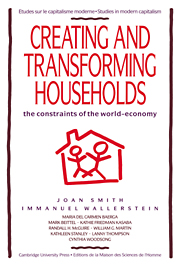Households as an institution of the world-economy
Published online by Cambridge University Press: 07 June 2010
Summary
The idea that there exists an “informal sector” of economic activity is a relatively new one. In the early 1970s feminist theorists raised the issue of domestic work as productive labor. At about the same time, Italian authors began to discuss l'economia sommersa, referring to small entrepreneurial activity in central Italy which evaded various legal restraints. Authors writing about eastern Europe began to discuss the phenomenon of artisans utilizing collectivized facilities for afterhours work that were privately contracted for, the clients wishing to avoid the long delays of “official” repair channels. Anthropologists began to reopen the question of the structure of the household in Third World areas.
The reality of course was not new, but the intellecutal discussion was, especially in relation to the standard analyses of the post-1945 period. Two things had happened. On the one hand, the world revolution of 1968, as one of its consequences, posed a challenge to the standard (and simplified) categories of mainstream social science, both in its liberal and Marxist variants. Simultaneously, the stagnation of the world-economy (the Kondratieff B-phase) led, as it had always done previously, to an expansion of the “informal” sector. Because of the first change, some social scientists were more sensitive to observing this phenomenon, especially since it had become more visible because of the second change.
Our own interest in the structure of households was a product of this changed intellectual climate.
- Type
- Chapter
- Information
- Creating and Transforming HouseholdsThe Constraints of the World-Economy, pp. 3 - 24Publisher: Cambridge University PressPrint publication year: 1992
- 14
- Cited by

